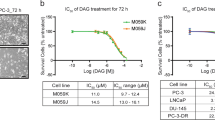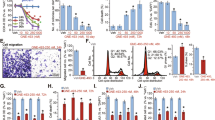Summary
Prostate cancer that is androgen-insensitive is unresponsive to a wide spectrum of cytotoxic agents, including all of the alkylating agents. Since a major pathway for the detoxification of the alkylating agents is conjugation with glutathione (GSH), GSH depletion has proved to be effective as a technique to restore melphalan sensitivity in melphalan-resistant cancer cell lines. However, the effect of GSH depletion has not been widely studied in tumor cell lines that have not developed resistance due to previous exposure to alkylating agents. Thus, we decided to investigate GSH depletion as a technique to increase melphalan cytotoxicity to PC-3 cells, an androgen-insensitive prostate cancer line. After 2 and 6 h incubation with 0.25–5 μm melphalan, virtually no effect was observed on either clonogenic lethality or MTT viability until 5 μm exposures. A 24-h incubation of the cells with 100 μm buthionine sulfoximine (BSO), an inhibitor of GSH synthesis, reduced the GSH content by 70%–75%. Following GSH depletion, an increase in clonogenic lethality and a decrease in MTT viability occurred after exposure to concentrations as low as 0.25 μm. The dose modification factor ranged from 2.9 after 2 h incubation to 4.5 at 6 h. These results provide support for additional studies in prostate cancer for further investigation of GSH depletion as a technique to induce sensitivity to alkylating agents in this chemotherapy-resistant tumor.
Similar content being viewed by others
References
Alberts DS, Sai Y, Chang HS, Chen G, Moon TE, Evans TL, Furner RL, Himmelstein K, Gross JF (1979) Kinetics of intravenous melphalan. Clin Pharmacol Ther 26:73–80
Anderson IC, Shpall EJ, Leslie DS, Nustad K, Ugestad K, Peters WP, Bast RC Jr (1989) Elimination of malignant clonogenic breast cancer cells from human bone marrow. Cancer Res 49:4659–4664
Anderson M (1985) Determination of glutathione and glutathione disulfide in biological samples. Methods Enzymol 113:548–564
Bosanquet AG, Gilby ED (1982) Pharmacokinetics of oral and intravenous melphalan during routine treatment of multiple myeloma. Int J Cancer Clin Oncol 18:355–362
Britten RA, Green JA, Broughton C, Browing PGW, White R, Warenius HM (1991) The relationship between nuclear glutathione levels and resistance to melphalan in human ovarian tumour cells. Biochem Pharmacol 41:647–649
Carter SK, Wasserman TH (1975) The chemotherapy of urologic cancer. Cancer 36:729–747
Dusre L, Mimnaugh EG, Myers CE, Sinha BK (1989) Potentiation of doxorubicin cytotoxicity by buthionine sulfoximine in multidrug-resistant human breast tumor cells. Cancer Res 49:511–515
Edwards PG (1988) Evidence that glutathione may determine the differential cell-cycle phase toxicity of a platinum (IV) antitumor agent. J Natl Cancer Inst 80:734–738
Fojo A, Hamilton TC, Young RC, Ozols RF (1987) Multidrug resistance in ovarian cancer. Cancer 60:2075–2080
Friedman HS, Colvin OM, Griffith OW, Lippitz B, Elion GB, Schold SC Jr, Hilton J, Bigner DD (1989) Increased melphalan activity in intracranial human medulloblastoma and glioma xenografts following buthionine sulfoximine-mediated glutathione depletion. J Natl Cancer Inst 81:524–527
Gittes RF (1991) Carcinoma of the prostate. N Engl J Med 324:233–245
Green JA, Vistica DT, Young RC, Hamilton TC, Rogan AM, Ozols RF (1984) Potentiation of melphalan cytotoxicity in human ovarian cancer cell lines by glutathione depletion. Cancer Res 44:5427–5431
Griffith OW, Meister A (1979) Potent and specific inhibition of glutathione synthesis by buthionine sulfoximine (S-n-butyl homocysteine sulfoximine). J Biol Chem 254:7558–7560
Hamilton TC, Winker MA, Louie KG, Batist G, Behrens BC, Tsuruo T, Grotzinger KR, McKoy WM, Young RC, Ozols RF (1985) Augmentation of Adriamycin, melphalan, and cisplatin cytotoxicity in drug-resistant and-sensitive human ovarian carcinoma cell lines by buthionine sulfoximine-mediated glutathione depletion. Biochem Pharmacol 34:2583–2586
Hansson J, Edgren M, Ehrsson H, Lewensohn R, Ringborg U (1987) Melphalan-induced DNA cross-linking in human melanoma cells and phytohaemagglutinin-stimulated lymphocytes in relation to intracellular drug content and cellular levels of glutathione. Anticancer Res 7:97–104
Hansson J, Berhane K, Castro VM, Jungnelius U, Mannervik B, Ringborg U (1991) Sensitization of human melanoma cells to the cytotoxic effect of melphalan by the glutathione transferase inhibitor ethacrynic acid. Cancer Res 51:94–98
Houghton AL, Robinson MRG, Smith PH (1977) Melphalan in advanced prostatic cancer: a pilot study. Cancer Treat Rep 61:923–924
Huggins C, Hodges CV (1941) Studies on prostatic cancer: 1. The effect of castration, of estrogen and of androgen injection on serum phosphatases in metastatic carcinoma of the prostate. Cancer Res 1:293–297
Jevtoric-Todorovic V, Guenthner TM (1991) Sensitization of human melanoma cells to melphalan cytotoxicity by Adriamycin and carmustine. J Cancer Res Clin Oncol 117:313–320
Jones WG (1988) Is there a place for chemotherapy in advanced prostatic cancer? Am J Clin Oncol 11 [Suppl 2]:S98-S100
Kasimis BS, Moran EM, Miller JB, Forbes KA, Kaneshiro CA, Poblet MT, Williams JL (1983) Treatment of hormone resistant metastatic cancer of the prostate with 5-FU, doxorubiein and mitomycin-C (FAM): a preliminary report. Cancer Treat Rep 67:937–939
Klein LS (1979) Prostatic carcinoma. N Engl J Med 300:824–833
Lai G, Ozols RF, Young RC, Hamilton TC (1989) Effect of glutathione on DNA repair in cisplatin-resistant human ovarian cancer cell lines. J Natl Cancer Inst 81:535–539
Loos U, Musch E, Engel M, Hartlapp JH, Hugl E, Dengler HJ (1988) The pharmacokinetics of melphalan during intermittent therapy of multiple myeloma. Eur J Clin Pharmacol 35:187–193
Lupera H, Droz JP, Pios G, Lapleige P, Theodore C (1989) Phase II trial of combination chemotherapy with fluorouracil, doxorubicin, and cisplatin in hormonally resistant metastatic prostatic adenocarcinoma. Oncology 46:372–374
Mahjoubi M, Azab M, Ghosn M, Theodore C, Droz J (1990) Phase II trial of ifosamide in the treatment of metastatic hormone-refractory patients with prostatic cancer. Cancer Invest 8:477–481
Mosmann T (1983) Rapid colorimetric assay for cellular growth and survival: application to proliferation and cytotoxic assays. J Immunol Methods 65:55–63
Murphy GP, Priore RL, Scardino PT (1988) Hormone-refractory metastatic prostatic cancer treated with methotrexate, cyclophosphamide plus Adriamycin, cis-platinum plus 5-fluouracil plus cyclophosphamide. Urology 32:33–40
O'Bryan RM, Luce JK, Talley RW, Gottlieb JA, Baker LH, Bonadonna G (1973) Phase II evaluation of Adriamycin in human neoplasia. Cancer 32:1–8
O'Leary M, Hickson K, Mulcahy RT, Wilding G (1990) Changes in glutathione (GSH)/glutathione-S-transferase (GST) detoxification system in melphalan (M)-resistant human prostate cancer cells. Proc Am Assoc Cancer Res 31:375
Pinto J, Bittner D, Garb J, Henry E, Heston W (1991) Effects of endogenous glutathione depletion on the efficacy of monoaziridinyl-putrescine in human prostatic carcinoma cells. Clin Res 32:177A
Rosenberg MC, Colvin OM, Griffith OW, Bigner SH, Elion GB, Horton JK, Lilley E, Bigner DD, Friedman HS (1989) Establishment of a melphalan-resistant rhabdomyosarcoma xenograft with cross-resistance to vincristine and enhanced sensitivity following buthionine sulfoximine-mediated glutathione depletion. Cancer Res 49:6917–6922
Russo A, Mitchell JB (1985) Potentiation and protection of doxorubicin cytotoxicity by cellular glutathione modulation. Cancer Treat Rep 69:1293–1296
Scher HI, Sternberg CN (1985) Chemotherapy of urologic malignancies. Semin Urol 3:239–280
Silverburg B, Boring CC, Squires TS (1990) Cancer statistics. CA-Cancer J Clin 40:9–26
Tattersall MHN, Jarman M, Newlands ES, Holyhead L, Milstead RAV, Weinberg A (1978) Pharmaco-kinetics of melphalan following oral or intravenous administration in patients with malignant disease. Eur J Cancer 14:507–513
Tew KD, Bomber AM, Hoffman SJ (1988) Ethacrynic acid and piriprost as enhancers of cytotoxicity in drug resistant and sensitive cell lines. Cancer Res 48:3622–3625
Trump DL, Loprinzi CL (1984) Phase II trial of etoposide in advanced prostatic cancer. Cancer Treat Rep 68:1195–1196
Yu YH, Crews JR, Cooper K, Ramakrishnan S, Houston LL, Leslie DS, George SL, Lidor Y, Boyer CM, Ring DB, Bast RC Jr (1990) Use of immunotoxins in combination to inhibit clonogenic growth of human breast carcinoma cells. Cancer Res 50:3231–3238
Author information
Authors and Affiliations
Rights and permissions
About this article
Cite this article
Canada, A., Herman, L., Kidd, K. et al. Glutathione depletion increases the cytotoxicity of melphalan to PC-3, an androgen-insensitive prostate cancer cell line. Cancer Chemother. Pharmacol. 32, 73–77 (1993). https://doi.org/10.1007/BF00685880
Received:
Accepted:
Issue Date:
DOI: https://doi.org/10.1007/BF00685880




